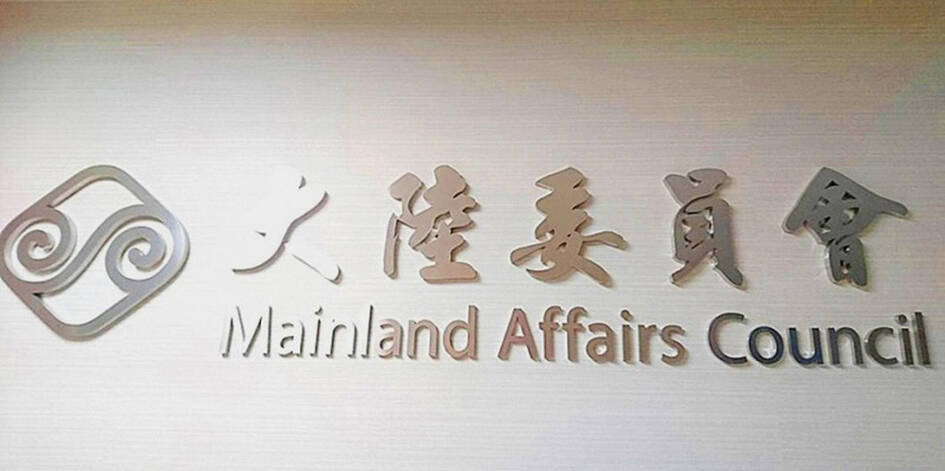Former head of the Chinese Nationalist Party’s (KMT) Huang Fu-Hsing chapter Tsang You-hsia (臧幼俠) and others might have broken the law when they allegedly stood for and sang the Chinese national anthem, the Mainland Affairs Council (MAC) said yesterday.
Local media yesterday reported that Tsang and Republic of China Military Academy Specific Subject Course Alumni Association chairman Chiang Cheng-lung (蔣成龍) allegedly attended an event hosted by the China Council for the Promotion of Peaceful National Reunification in Hong Kong on Aug. 20.
The two allegedly stood to attention when the Chinese national anthem was played and its national flag raised, which might constitute an offense after the Act Governing Relations Between the People of the Taiwan Area and the Mainland Area (臺灣地區與大陸地區人民關係條例) was revised in 2016.

Photo: Chung Li-hua, Taipei Times
The MAC yesterday said that the individuals’ original serving agency would head an investigation and prosecute them to the full extent of the law if the accusations are proved.
If found guilty, Tsang and Chiang would have to return their pensions — either 50 percent or in their entirety — within five months of Aug. 20, or if the agency finds their actions to be a severe offense, their pensions would be revoked and all money received would have to be returned to the state.
Democratic Progressive Party (DPP) Legislator Wang Ting-yu (王定宇) yesterday said that the China Council for the Promotion of Peaceful National Reunification was founded by the Chinese Communist Party (CCP) and is known to be headed by a member of the party’s politburo.
Tsang and others attending a CCP-founded organization ahead of yesterday’s Armed Forces Day resulting in scandalous rumors is an insult to all those in the military defending their nation, he said.
DPP caucus secretary-general Rosalia Wu (吳思瑤) said that if Tsang, a former military official tasked with safeguarding Taiwan, is proven to have acted in ways that undermine national dignity, no military personnel would support him.
The KMT yesterday said that Tsang had not been a party official for many years and had attended the event in a personal capacity, adding that he should make a statement about the incident.
As of press time last night, Tsang was unavailable for comment.
The 2016 amendment to the act states that people serving as the deputy head of the national defense, foreign affairs, mainland affairs, national security or other agencies or who attained the rank of major general before retirement are banned from conducting themselves in a manner that would undermine national dignity at affairs or events held by the CCP, the Chinese military, or Chinese administrative or political organs.
The same amendment defines actions that would undermine national dignity as saluting the Chinese national flag or emblem or singing songs representing the government of China.
Additional reporting by Shih Hsiao-kuang

Palauan President Surangel Whipps Jr arrived in Taiwan last night to kick off his first visit to the country since beginning his second term earlier this year. After arriving at Taoyuan International Airport at around 6:30 pm, Whipps and his delegation were welcomed by Minister of Foreign Affairs Lin Chia-lung (林佳龍). Speaking to gathered media, the Palauan leader said he was excited and honored to be back in Taiwan on his first state visit to Taiwan since he was sworn in this January. Among those traveling with Whipps is Minister of State Gustav N. Aitaro, Public Infrastructure

President William Lai (賴清德) yesterday thanked Palau for its continued support of Taiwan's international participation, as Taipei was once again excluded from the World Health Assembly (WHA) currently taking place in Switzerland. "Palau has never stopped voicing support for Taiwan" in the UN General Assembly, the WHO and other UN-affiliated agencies, Lai said during a bilateral meeting with visiting Palau President Surangel Whipps Jr. "We have been profoundly touched by these endorsements," Lai said, praising the Pacific island nation's firm support as "courageous." Lai's remarks came as Taiwan was excluded for the ninth consecutive year from the WHA, which is being held in

RESOLUTIONS DEBATE: Taiwan’s allies said that UN and WHA resolutions cited by China and other nations ‘do not determine Taiwan’s participation in WHO activities’ A proposal to invite Taiwan to this year’s World Health Assembly (WHA) was rejected on Monday, resulting in Taipei’s absence from the annual meeting for a ninth consecutive year, although partners spoke up for Taiwan’s participation at the first day of the meeting. The first agenda item after the opening was a “two-on-two debate” on a proposal to invite Taiwan to participate at the WHA as an observer. Similar to previous years, two countries made statements in favor of the proposal, while two others expressed their opposition. Philippine Secretary of Health Teodoro Herbosa, president of the 78th WHA, accepted the WHA General Committee’s

At least three people died and more than a dozen were injured yesterday afternoon when a vehicle struck a group of pedestrians in New Taipei City’s Sansia District (三峽). The incident happened at about 4pm when a car rammed into pedestrians at an intersection near Bei Da Elementary School. Witnesses said the sedan, being driven at a high speed, ran a red light, knocking scooters out of the way and hitting students crossing the road before careening into a median near the intersection of Guocheng and Guoguang streets. The incident resulted in three deaths and 13 injuries, including the driver, a 78-year-old man